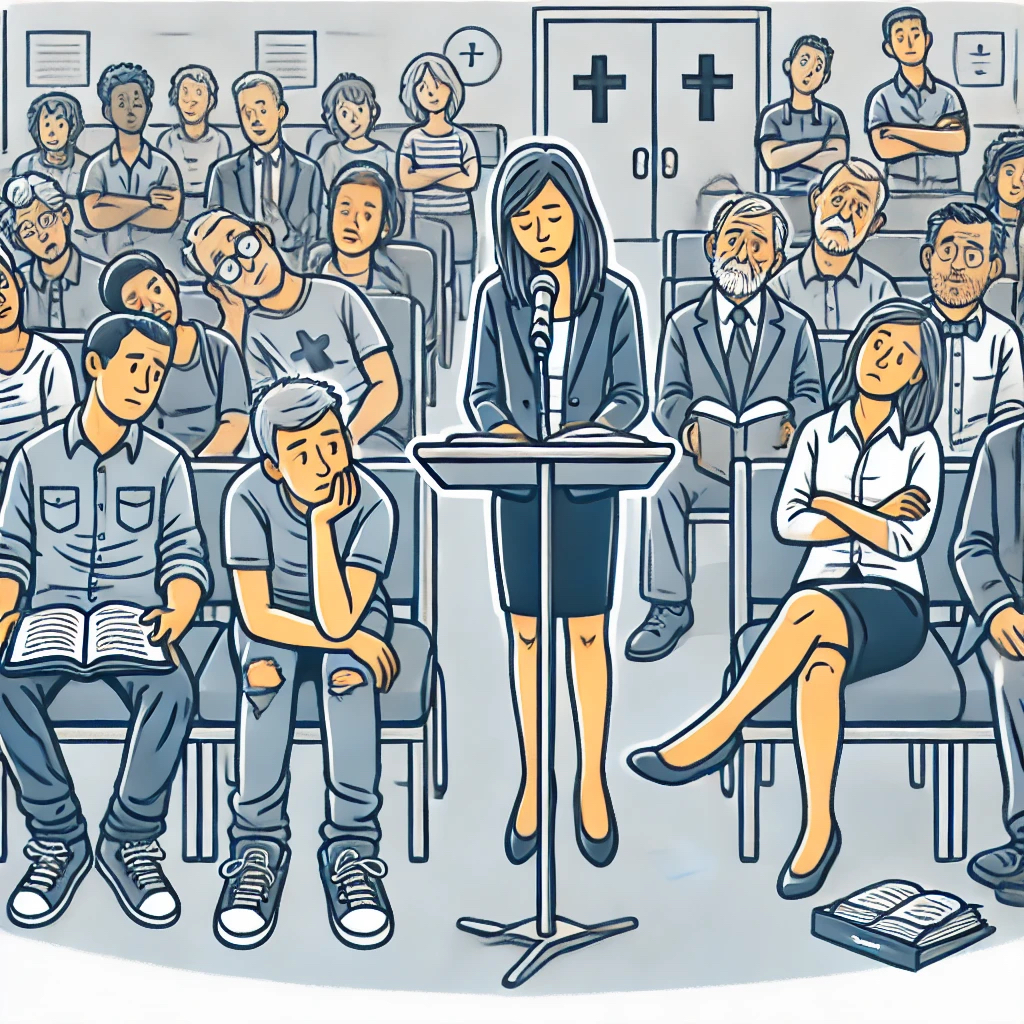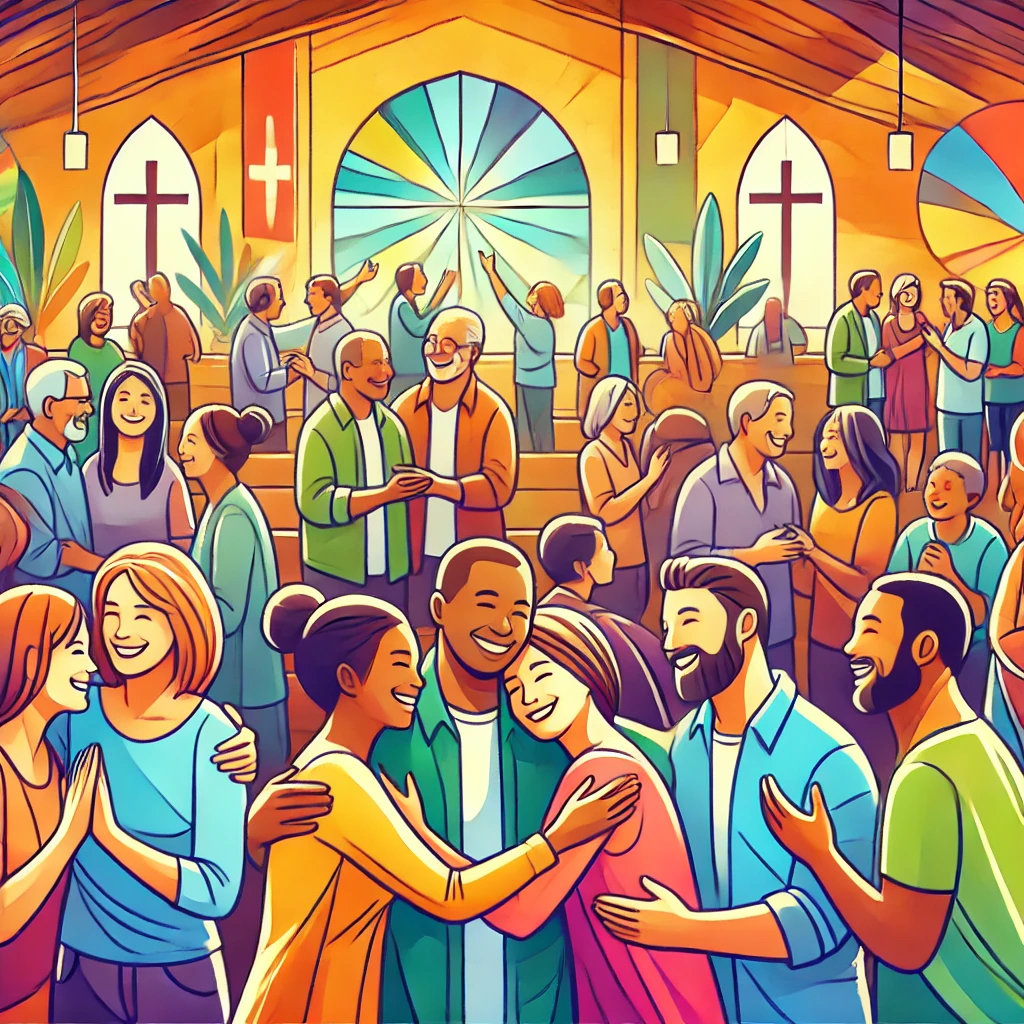弟兄姐妹们,让我们现在思考一个问题,您察觉到没有:无论是线上还是线下,我们越来越多地看到一种充斥着自我保护、精致利己和对他人冷漠的风气。网络上充满了所谓“独善其身”的方略,短视频不断向大众传达这些策略,警惕人们不要被自己的热情埋单……这看似是一种智慧的个人自保,其实是一种找不到解决现实问题的下下策,背后隐藏着对他人冷漠和对现实的逃避。反过来说,每个人也在遭受着他人的冷漠对待,一旦灾难临到自己后便会身临其境的体会到,这便是一个冷漠带来相互伤害的社会现状。
许多人不再愿意为他人的困境发声,而是将所有精力集中于自我的满足与保护。这种现象在社会中比比皆是。往宏观的方面说,雾霾进入人们视线、化学试剂渗入老百姓的口粮、人口被失踪、器官被移植、妇女被铁链等等,不了了之,令人痛心;往日常生活来说:在食品蔬菜的种植、加工过程中,只要不是自己吃便将安全、卫生踩在脚下,即使身在政府管理部门也不会去过问;在工作中,同事之间只求互不干扰,对彼此的成长和发展不闻不问;在社交中,朋友之间关系疏离,更多是出于利益考量;在家庭中,很多人甚至对至亲也缺乏关爱,只在乎自己能从中获得的好处。令人痛心的是,这样的现象在走出教会的基督徒群体中也并不少见,甚至更多。

教会中的不和谐现象
作为基督徒,我们被呼召要彼此相爱,成为或去做光和盐。然而,许多基督徒却被撒但的诡计蒙蔽,采用了世俗的行事方式。他们遇到上述问题和现象时表现出的冷漠和无奈并不少见,同时,对教会中弟兄姐妹的属灵成长也如同对待这些事情的态度,漠不关心,甚至对别人的属灵见证嗤之以鼻。当有弟兄在分享他的生命成长及其属灵变化时,可能会面对冷漠的回应,甚至是来自其他基督徒的质疑和论断。
一些人对他人的信仰表达持怀疑态度,认为他们的属灵经验不过是肤浅的感情冲动,甚至凭自己的神学知识以一种高高在上的态度来评论他人的见证。这些不和谐的现象正是撒但利用人心中的骄傲与自私所带来的后果。很多人,包括基督徒,往往将撒但看作一种具象的鬼怪,实际上撒但更多是我们内心中对抗神带领的思想和意念。当我们心中充满骄傲、自私、冷漠和对他人的论断时,撒但的诡计就在我们心中得逞,为这冷漠、互害的社会又熄灭了一束亮光。

设想一下《约翰福音》中的那个场景,“兵丁既然将耶稣钉在十字架上,就拿他的衣服分为四份,每兵一份;又拿他的里衣,这件里衣原来没有缝儿,是上下一片织成的。他们就彼此说:“我们不要撕开,只要拈阄,看谁得着。”这要应验经上的话说:他们分了我的外衣,为我的里衣拈阄。兵丁果然做了这事。”(约翰福音 19:23-24 和合本),看看这些士兵,再相较于一些基督徒面对涉及个人利益的处理方式,毫无二致。他们只关注眼前的利益,而未能意识到信仰的真正价值,即便在现代社会中,许多人将信仰视为一种工具,用以满足个人的需求和欲望,然而这种态度使他们失去了与神的真实关系。就像兵丁们冷漠地分割耶稣的衣物,很多信徒在教会和社交生活中,也可能对他人表现出冷漠与自私,甚至不愿意参与彼此的支持与关爱。

借着这段经文的寓意,我们可以反思自己的信仰态度:我们是否在像兵丁那样,只关注眼前的利益,而忽略了耶稣为我们所做的牺牲和教导?基督徒也是这个社会的一分子,也面临着同样的社会问题和个人生活问题,但不要忘记自己身上的真理武装,它是我们抵制这种精致利己的思维方式,转而回归基督的呼召的契机,是我们真正理解并实践彼此相爱的命令禾场。
采用世俗方式的后果
当基督徒采用世人的行事方式时,实际上是在偏离神的道路,远离了耶稣基督带领的自由生活,是在主动将自己属灵权柄搁置甚至弃绝。撒但利用人心中的自我保护欲望,将世俗的价值观包装成看似合理的生活哲学,诱导基督徒走向偏离基督教导的道路,如同猪洗净了又滚回猪圈中(猪洗净了,又回到泥里去滚。这话在他们身上正合适。(彼得后书 2:22b 和合本)),随之而来的还有更多的烦恼和后遗症。具体来讲:
1,自我中心的态度会带来孤立和内心的空虚。当我们只顾自己的利益,而不去关心他人时,我们会发现自己逐渐失去了与他人的真实连接。人与人之间的关系变得浅薄,甚至在教会内也难以找到真正的朋友和支持。这种孤立感会让我们感到更加焦虑和不安,因为我们失去了彼此相爱的温暖。
2,论断和骄傲的态度会导致内心的挣扎和属灵上的停滞。当我们以批判和高傲的态度看待其他弟兄姐妹时,我们的心灵也在逐渐远离神的恩典。我们被骄傲蒙蔽,无法看到自己的不足,也因此失去了从神而来的教导和改变的机会。长期以来,这种态度会让我们属灵生命停滞不前,甚至滑向冷漠和远离神的境地。
3,依靠自己的力量面对生活的挑战,会让我们深陷在无尽的压力和烦恼中。世俗的方式教导我们通过自己的努力去争取成功和安全,但这种方式却常常让我们感到力不从心。我们越是依靠自己的能力,就越会感受到自己的不足和软弱,最终陷入无尽的焦虑和疲惫。而这一切便会成为我们身体疾病的来源。
依靠神的优势
与之相对,当我们愿意放下自己的骄傲与自我保护,重新依靠神的带领时,我们会发现生活中充满了神的恩典与祝福。依靠神,让我们在他的带领下找到真正的平安和安逸。看吧:
1,依靠神使我们能在属灵上找到安慰和力量。当我们把一切重担交托给神时,他必会赐给我们超越理解的平安。正如《腓立比书》4:6-7中所说:“应当一无挂虑,只要凡事借着祷告、祈求和感谢,将你们所要的告诉神,神所赐出人意外的平安,必在基督耶稣里保守你们的心怀意念。”这种平安是世界所无法给予的,是神对信靠他之人的特别恩典。
2,依靠神使我们能够从容面对世间的纷扰,活在当下。在这个充满竞争和压力的世界中,我们难免会遇到各种挑战和搅扰。然而,当我们依靠神时,我们的心就不会被这些外在的因素所动摇。我们知道,无论前路如何,神必与我们同在,我虽然行过死荫的幽谷,也不怕遭害,因为你与我同在;你的杖,你的竿,都安慰我。(诗篇 23:4 和合本)。正是这种对神的信靠,使我们能够从容面对一切,不再因外界的变化而惊慌失措。依靠神也意味着我们要活在每一刻的带领中,不为过去的错误懊悔,不为未来的未知担忧,而是在每一个当下信靠他的指引,享受他的同在。
3,依靠神让我们能够真正彼此相爱,活出丰盛的生命。当我们意识到自己的一切都是从神而来,我们就不再执着于个人的利益和成就,而是愿意把爱与恩典分享给他人。教会因此成为一个充满爱与支持的大家庭,每一个弟兄姐妹都能在这里找到属灵的支持和鼓励。正如《约翰福音》13:34中耶稣所说的:“我赐给你们一条新命令,乃是叫你们彼此相爱;我怎样爱你们,你们也要怎样相爱。”这种彼此相爱的关系,不仅使我们个人的属灵生命得以成长,也使整个教会充满神的荣耀。

结语:回归基督的呼召
撒但的诡计就在于让我们相信,精致利己和独善其身是智慧的选择,但这种选择却使我们远离了神的爱与恩典。作为基督徒,我们必须警醒,不要被世俗的风气所左右,而是要坚定地依靠神,活出他的呼召。在爱中彼此扶持,在信心中共同成长,真正成为世界的光和盐,见证神的荣耀。
愿我们每一个基督徒都能摆脱世俗的标准,回归基督的怀抱,彼此相爱,彼此扶持,活出一个与世俗不同的精彩人生。让我们在神的带领下,找到真正的平安和喜乐,从容面对一切挑战,活在神带领的每一刻,活出神所应许的丰盛生命。
疫情期间的核酸检测给无数个人和家庭的衣食住行带来了无尽的折磨和伤害,弊相较于利如“九九八十一牛和一毛”,但那种不做核酸就让你‘寸步难行’的决绝劲头是基督徒抵挡撒但搅扰、摆脱精致利己主义时需要借鉴的。

请弟兄姐妹们一起为此祷告!
如有问题请联系[email protected]。
Watch Out for Satan’s Schemes, Break Free from Refined Selfishness, and Live Out Christ’s Call!
Dear brothers and sisters, let us consider a question: Have you noticed that both online and offline we are increasingly witnessing a prevailing atmosphere of self-protection, refined selfishness, and indifference toward others? The internet is full of strategies promoting “self-contained virtue,” with short videos constantly conveying these approaches—warning people not to “pay the price” for their passion. What may seem like wise personal self-preservation is, in fact, a last-ditch tactic that finds no true solution to our real-world problems. Behind it lies a hidden indifference toward others and an escape from facing reality. Conversely, everyone is also suffering from others’ indifference. When disaster strikes, one will come to deeply experience that such widespread coldness only breeds mutual harm in society.
Many people are no longer willing to speak out for those in distress; instead, they concentrate all their energy on satisfying and protecting themselves. This phenomenon is pervasive throughout society. On a macro level, we see it in the dense smog that fills our skies, chemical residues seeping into people’s food supplies, cases of disappearances, organ trafficking, and even women being chained—incidents left unresolved that cause great sorrow. In everyday life, during food and vegetable cultivation and processing, if it is not for one’s own consumption, safety and sanitation are trampled underfoot; even government officials do not question such practices. At work, colleagues often merely avoid interfering with one another, showing little interest in each other’s growth and development; in social settings, friendships become distant and are predominantly based on personal gain; and within families, many individuals care little for even their closest kin, only caring about what benefits they can personally extract. Regrettably, such a state of affairs is found even among Christians who have left the church, and perhaps even more so.
Discord within the Church
As Christians, we are called to love one another and to be the light and salt of the world. Yet many believers have been deceived by Satan’s cunning, adopting worldly methods in their actions. It is not uncommon to see indifference and helplessness when confronted with the issues mentioned above—even within the church, the attitude toward the spiritual growth of fellow believers is one of apathy. When a brother shares his journey of life and spiritual transformation, he may be met with indifferent responses or even criticism and judgment from other Christians.
Some people remain skeptical of others’ expressions of faith, dismissing their spiritual experiences as shallow emotional impulses, and even using their own theological knowledge to criticize others from a superior vantage. These discordant phenomena are precisely the result of Satan exploiting the pride and selfishness in our hearts. Many, including Christians, often view Satan as a tangible demon; in reality, Satan more fully represents the inner thoughts and attitudes that counter God’s leading. When our hearts are filled with pride, selfishness, indifference, and judgment toward others, Satan’s schemes succeed in our midst—dimming a light that might otherwise shine in this society of mutual harm.

Consider the scene described in the Gospel of John:
“Then the soldiers, when they had crucified Jesus, took His garments and made four parts, to each soldier a part, and also the tunic. Now the tunic was without seam, woven from the top in one piece. They said therefore among themselves, “Let us not tear it, but cast lots for it, whose it shall be,” that the Scripture might be fulfilled which says: “They divided My garments among them, And for My clothing they cast lots.” Therefore the soldiers did these things.” (John 19:23–24, NKJV) Observe these soldiers—and compare them to some Christians today whose handling of matters involving personal interests appears no different. They focus solely on immediate gains, failing to recognize the true value of faith. Even in modern society, many view their faith merely as a tool to satisfy personal needs and desires; yet this attitude causes them to lose a genuine relationship with God. Just as the soldiers callously divided Jesus’ garments, many believers in church and social life may exhibit indifference and selfishness toward others, even refusing to engage in mutual support and care.

Drawing on the symbolism of this passage, we can reflect on our own attitude toward faith: Are we, like the soldiers, focused only on immediate gains while ignoring the sacrifice and teaching of Jesus? As Christians, we are part of society and face the very same social and personal issues. But let us not forget that the true value of our faith offers us an opportunity to reject refined selfishness and return to Christ’s call—a chance to fulfill the command to love one another in both word and deed.
The Consequences of Adopting Worldly Methods
When Christians adopt worldly ways, they stray from God’s path and the freedom that Jesus offers. In doing so, they effectively set aside—and sometimes even reject—the spiritual authority bestowed upon them. Satan exploits our natural instinct for self-protection by packaging secular values as seemingly sound philosophies, luring believers away from the teachings of Christ. It is much like the proverb about pigs: “But it has happened to them according to the true proverb: “A dog returns to his own vomit,”” This saying (as found in 2 Peter 2:22, NKJV paraphrased) is fitting for those who, after cleansing themselves superficially, fall right back into their old ways. The consequence is that we invite more trouble and long-term fallout.
Specifically:
- A self-centered attitude leads to isolation and inner emptiness. When we focus solely on our own interests and neglect others, we gradually lose genuine connections with those around us. Relationships become superficial—even within the church, true friends and support may be scarce. This isolation breeds further anxiety and insecurity because we forgo the warmth of mutual love.
- A judgmental and proud attitude leads to inner turmoil and spiritual stagnation. When we regard other brothers and sisters with criticism and arrogance, our own hearts drift further from God’s grace. Blinded by pride, we fail to see our own shortcomings, thus losing the opportunity for God’s correction and transformation. Over time, this attitude causes our spiritual life to stagnate, perhaps even leading to a state of indifference and estrangement from God.
- Relying solely on one’s own strength to face life’s challenges leaves us mired in unending pressure and worry. Secular methods teach us to struggle for success and security on our own; however, this often reveals our limitations and weaknesses, eventually plunging us into ceaseless anxiety and fatigue—and such conditions can become a source of physical ailments.
The Advantages of Relying on God
In contrast, when we choose to relinquish our pride and self- protection and to depend on God’s guidance, we begin to see life filled with divine grace and blessing. Relying on God allows us to find true peace and comfort. Consider the following:
- Relying on God Provides Spiritual Comfort and Strength:
When we entrust all our burdens to the Lord, He grants us a peace beyond human understanding. As Philippians 4:6–7 NKJV states, “Be anxious for nothing, but in everything by prayer and supplication, with thanksgiving, let your requests be made known to God; and the peace of God, which surpasses all understanding, will guard your hearts and minds through Christ Jesus.” This peace is a unique blessing from God, available only to those who trust in Him.
- Relying on God Enables Us to Face Life’s Turmoil with Calm:
In our competitive and pressure-filled world, challenges are inevitable. Yet when we depend on God, our hearts remain unshaken by external circumstances. We know that whatever lies ahead, God is with us. As the Psalmist writes in Psalm 23:4 NKJV, “Yea, though I walk through the valley of the shadow of death, I will fear no evil; For You are with me; Your rod and Your staff, they comfort me.” Trusting in God enables us to face challenges with composure, free from panic over external changes.
- Relying on God Empowers Us to Truly Love One Another:
Recognizing that everything comes from God, we cease to cling obsessively to personal gain and instead freely share love and grace with others. The church then becomes a large family filled with mutual care and support, where each brother and sister finds spiritual encouragement. As Jesus instructed in John 13:34 NKJV, “A new commandment I give to you, that you love one another; as I have loved you, that you also love one another.” This mutual love not only grows our individual spiritual lives but also glorifies God throughout the entire community.
Conclusion: Return to Christ’s Call
Satan’s cunning lies in convincing us that refined selfishness and a “mind solely on self” are wise choices. Yet such choices lead us away from God’s love and grace. As Christians, we must stay alert—not letting the trends of the world sway us—but instead stand firmly, relying on God to live out His calling. In loving one another, supporting each other in faith, and growing together, we become the light and salt of the world, testifying to God’s glory.

May every Christian cast aside worldly standards, return to Christ’s embrace, love and support one another, and live out a life that stands in stark contrast to the world. Under God’s guidance, may we find true peace and joy, face every challenge with courage and grace, and live each moment in the light of His promises of abundant life.
During the pandemic, mandatory nucleic acid testing inflicted relentless suffering on countless individuals and families, disrupting livelihoods with harms far outweighing benefits—akin to “ninety-nine oxen versus a single hair” in its lopsided imbalance. Yet the unyielding resolve behind policies like “no test, no mobility”—which paralyzed daily life—holds a paradoxical lesson for Christians: such ironclad determination to resist compromise is precisely what believers must cultivate to thwart Satan’s schemes and dismantle the soul-corrosive grip of self-serving individualism.
Dear brothers and sisters, let us pray together for this, that we might remain steadfast in our faith, break free from self-centered living, and truly live out the calling of Christ!

发表回复